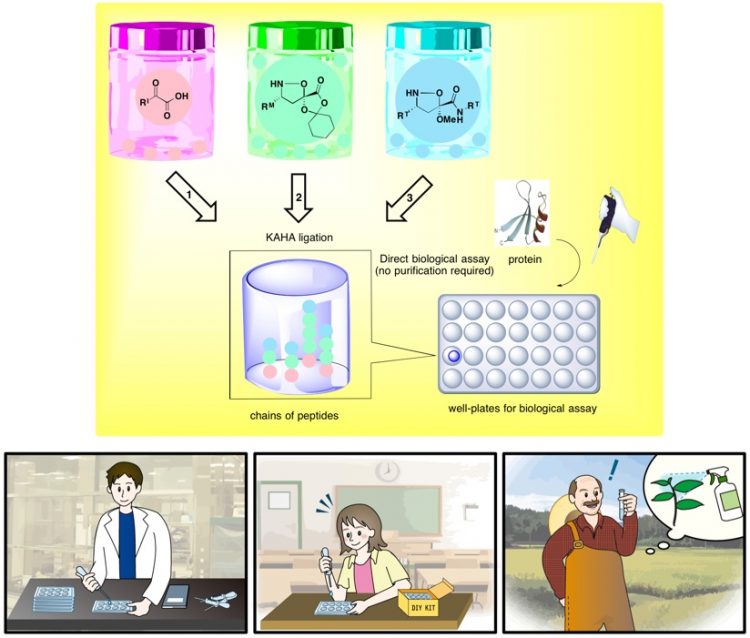“Growing” molecules on plates

Figure 1. “Synthetic Fermentation” - synthesizing libraries of compounds on well-plates that can be directly tested for biological activity such as in the lab, at high schools and on farms. Copyright : ITbM, Nagoya University
Microorganisms are able to synthesize mixtures of complex organic molecules, such as antibiotics from simple organic building blocks by fermentation. Prof. Jeffrey Bode, who led the research, was inspired by this approach and realized that synthetic chemistry could also “grow” biologically active molecules by using his powerful bond making reaction, KAHA (alpha-ketoacid-hydroxylamine) ligation.
This reaction enables rapid formation of an amide bond, found in peptides and proteins, simply by mixing in order an alpha-ketoacid molecule and a hydroxylamine molecule in water. No additional reagents and no subsequent purification are required in the reaction.
“Synthetic fermentation” applies the KAHA ligation reaction to build ‘cultures’ of compounds in well-plates that can be subjected directly to biological assays. Prof. Bode’s technique has demonstrated that about 6,000 unnatural peptides can be made from only 23 building blocks, and has succeeded in identifying a biologically active molecule towards treatment of the hepatitis C virus.
Details of this new technique, published online on September 7, 2014 in Nature Chemistry, is expected to be useful for rapidly generating thousands or millions of molecules, which will be useful for drug discovery as well as for onsite screening of biologically active molecules.
“Our dream is to provide a “do-it-yourself” method – one that can be done by anyone, anywhere to make and assess millions of organic molecules, without using dangerous reagents,” says Prof. Bode. “We envision that synthetic fermentation could be used by farmers to generate and identify new anti-bacterial or anti-fungal molecules to treat plant diseases,” describes Prof. Bode.
Organic synthesis often involves multiple steps, the use of toxic reagents and requires tedious purification prior to biological screening. Prof. Bode says, “The hardest part of this work was looking beyond the entrenched idea that we needed single, pure compounds to do the biological screening. It was only when we looked at the way Nature makes new medicines – by producing dozens of similar compounds together – that we realized we could use our chemistry to do something very similar. By taking this inspiration, we found that we could make thousands of compounds from a few building blocks in a few hours, rather than the months it would normally take.”
“By providing a safe and simple method to form new organic molecules, we hope to establish kits combined with a suitable assay that can be used by anyone to discover new molecules with a desired function or property,” says Prof. Bode.
This article “Synthetic fermentation of bioactive non-ribosomal peptides without organisms, enzymes or reagents” by Yi-Lin Huang and Jeffrey W. Bode is published online on September 7, 2014 in Nature Chemistry as an Advanced Online Publication.
DOI: 10.1038/nchem.2048
About WPI-ITbM (http://www.itbm.nagoya-u.ac.jp/)
The World Premier International Research Center Initiative (WPI) for the Institute of Transformative Bio-Molecules (ITbM) at Nagoya University in Japan is committed to advance the integration of synthetic chemistry, plant/animal biology and theoretical science, all of which are traditionally strong fields in the university. As part of the Japanese science ministry’s MEXT program, ITbM aims to develop transformative bio-molecules, innovative functional molecules capable of bringing about fundamental change to biological science and technology. Research at ITbM is carried out in a “Mix-Lab” style, where international young researchers from multidisciplinary fields work together side-by-side in the same lab. Through these endeavors, ITbM will create “transformative bio-molecules” that will dramatically change the way of research in chemistry, biology and other related fields to solve urgent problems, such as environmental issues, food production and medical technology that have a significant impact on the society.
Author Contact
Professor Jeffrey Bode
Institute of Transformative Bio-Molecules (WPI-ITbM), Nagoya University
Furo-Cho, Chikusa-ku, Nagoya 464-8601, Japan
E-mail: bode@itbm.nagoya-u.ac.jp
ETH-Zürich
Laboratory of Organic Chemistry
HCI F 315, Wolfgang-Pauli-Strasse 10
8093 Zürich, Switzerland
Tel: +41-44-633-2103
E-mail: bode@org.chem.ethz.ch
Public Relations Contact
Dr. Ayako Miyazaki
Institute of Transformative Bio-Molecules (WPI-ITbM), Nagoya University
Furo-Cho, Chikusa-ku, Nagoya 464-8601, Japan
TEL: +81-52-789-4999 FAX: +81-52-789-3240
E-mail: press@itbm.nagoya-u.ac.jp
Nagoya University Public Relations Office
TEL: +81-52-789-2016 FAX: +81-52-788-6272
E-mail: kouho@adm.nagoya-u.ac.jp
Associated links
- http://dx.doi.org/10.1038/nchem.2048
- http://www.itbm.nagoya-u.ac.jp/en/research/2014/09/bode-fermentation.php
Journal information
Nature Chemistry
Media Contact
More Information:
http://www.researchsea.comAll latest news from the category: Life Sciences and Chemistry
Articles and reports from the Life Sciences and chemistry area deal with applied and basic research into modern biology, chemistry and human medicine.
Valuable information can be found on a range of life sciences fields including bacteriology, biochemistry, bionics, bioinformatics, biophysics, biotechnology, genetics, geobotany, human biology, marine biology, microbiology, molecular biology, cellular biology, zoology, bioinorganic chemistry, microchemistry and environmental chemistry.
Newest articles

Recovering phosphorus from sewage sludge ash
Chemical and heat treatment of sewage sludge can recover phosphorus in a process that could help address the problem of diminishing supplies of phosphorus ores. Valuable supplies of phosphorus could…

Efficient, sustainable and cost-effective hybrid energy storage system for modern power grids
EU project HyFlow: Over three years of research, the consortium of the EU project HyFlow has successfully developed a highly efficient, sustainable, and cost-effective hybrid energy storage system (HESS) that…

After 25 years, researchers uncover genetic cause of rare neurological disease
Some families call it a trial of faith. Others just call it a curse. The progressive neurological disease known as spinocerebellar ataxia 4 (SCA4) is a rare condition, but its…





















